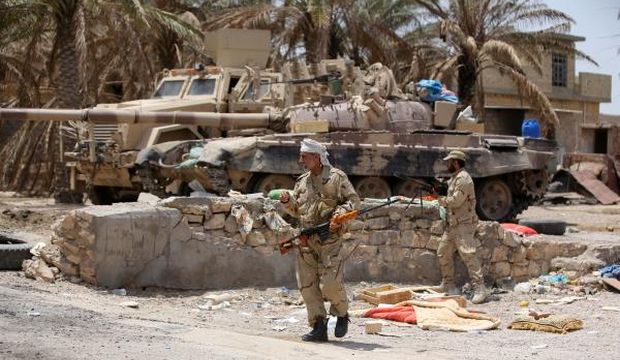
Armed Iraqi Shi’ite fighters from the Popular Mobilization units, supporting the Iraqi government forces, guard a position during clashes with the Islamic State of Iraq and Syria (ISIS) group’s militants on July 15, 2015 in the town of Saqlawiya on the outskirts of Fallujah, Iraq. (AFP Photo/Ahmad Al-Rubaye)
Baghdad, Asharq Al-Awsat—The Iraqi High Commission for Human Rights (IHCHR) has warned that the Islamic State of Iraq and Syria (ISIS) plans to commit “genocide” against civilians and government troops in the central Iraqi city of Fallujah, as the Iraqi government’s operation to liberate the city and other regions of the Anbar province from the extremist group begins.
In a statement on Tuesday the IHCHR said it had evidence that ISIS, which has controlled Fallujah since January 2014, was “planning to take specific measures to commit systematic genocide of all civilians who do not abide by their orders—and do the same for security forces.”
It said the extremist group had “booby-trapped all mosques and minarets, civilian homes, as well roads leading to Fallujah and public buildings in the city in order to cause the greatest number of human and material losses in a bid to commit a systematic genocide.”
The statement added that ISIS has for three months been using residents in Anbar as “human shields,” trapping people in buildings which they knew will be targeted by government forces.
In a bid to smother local opposition to the group which could grow as government troops advance, ISIS has been abducting women and girls, demanding ransom from family members.
The IHCHR labeled ISIS’s activities in Fallujah and parts of Anbar it controls as crimes against humanity.
This comes as the Iraqi military announced on Monday it had begun a long-awaited operation to liberate the Anbar province, large parts of which are now controlled by the extremist group.
In addition to Fallujah and a number of other areas, ISIS also controls the provincial capital Ramadi, which it seized amid what many in Iraq deemed an embarrassing retreat by military and security forces in the city.
Ali Dawud, a local judicial official, told Asharq Al-Awsat government forces had launched a “fierce onslaught” against ISIS in Anbar during the initial stages of the operation, which are targeting Fallujah and Ramadi as well as surrounding areas controlled by the group.
Jassim Al-Halbousi, a member of the Anbar Provincial Council, told Asharq Al-Awsat “dozens” of ISIS fighters and senior commanders had already been killed in the offensive.
As in previous government operations against ISIS, Shi’ite volunteer forces, known as the Popular Mobilization, are fighting alongside government troops.
However, the Popular Mobilization have been accused by a number of international organizations and NGOs of committing human rights abuses against Sunnis in areas they have liberated from ISIS, including killing civilians and burning homes and entire villages.
Some commanders from the Popular Mobilization have reportedly publicly stated in recent days that only ISIS fighters remain in some areas of Anbar such as Fallujah.
This has sparked fears of similar transgressions in Sunni-dominated Anbar as the operation begins.
Speaking to Asharq Al-Awsat on Tuesday, Sheikh Hamid Al-Jumaili, a prominent Sunni tribal leader in Fallujah, denied only ISIS fighters remained in Fallujah, referring to a common ISIS strategy of keeping the local population trapped in areas it controls.
He also echoed the statement by the IHCHR, maintaining that ISIS had been using civilians as human shields in the face of any onslaught by government troops, and stopping people from leaving the areas the group controls.
He said the alleged comments made by Popular Mobilization commanders were “vengeful and will have negative consequences.”
To prevent “instances of what occurred previously” in other areas liberated by the Popular Mobilization, Jumaili said local Sunni tribal leaders have been coordinating with the government.
Meanwhile, Iraqi Vice President Iyad Allawi on Tuesday called on the government to ensure “reconciliation and national unity” in “all areas where our troops are fighting ISIS’ gangs.”
Speaking to Asharq Al-Awsat on Tuesday, he said the government “must protect the lives of innocent and unarmed civilians who are trapped in Ramadi and Fallujah and other towns and cities in Anbar.”
Manaf Al-Obaidi contributed additional reporting from Baghdad.
